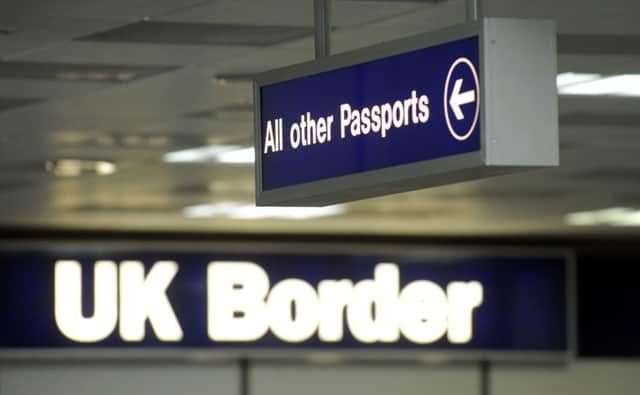Leaders: Better checks needed on foreign criminals


In recent months, Polish national Robert Buczek was sentenced to 20 years in prison for murdering an 85-year-old Edinburgh woman in her Morningside home. Buczek had a conviction for assaulting and robbing a pensioner in Poland when 14.
Mother-of-three Mary McLaren was raped and murdered in Dundee in 2010 by Patrick Rae, a registered sex offender from the Republic of Ireland allowed to enter Scotland undetected under EU freedom of movement rules.
Advertisement
Hide AdAdvertisement
Hide AdThe same rules allowed Moira Jones’ murderer Marek Harcar [she was killed in Queen’s Park in Glasgow in 2008] and Jolanta Bledaite’s killer Vitas Plytnykas [her head was found on a beach in Arbroath in 2008] into the country despite their previous convictions for violence.
Yesterday, Westminster’s home affairs committee said that convicted criminals are being allowed to slip into Britain unnoticed to commit serious crimes, with major gaps in the ability of police and border officials to track their movements.
British police are unable to identify and arrest foreign criminals because the information they are being given is out of date while Home Office computer systems are not “fit for purpose”, the committee said. Significantly, officers fail to carry out criminal record checks on a third of foreigners arrested in the UK.
The committee said there were 760 foreign offenders in the UK, some of whom have been on the run for up to five years.
Previous reports have said that almost one in ten police incidents in Scotland now involves a foreign national, with the numbers doubling in the decade since mass European Union migration.
Importantly, however, the ratio of overseas nationals in custody, at about 7 per cent, is in line with their share of the general population. The share of Scotland’s population born outside the UK, which includes people who are ethnic Scots and not foreign nationals, rose from 3.8 per cent in 2001 to 7 per cent at the 2011 census.
The data suggest so-called “new Scots” are not more likely to commit serious crime than indigenous ones.
The key issue is that criminals, whatever their nationality, should be subject to the same monitoring and checks as UK citizens. This is particularly important for the most dangerous sexual and violent individuals.
Advertisement
Hide AdAdvertisement
Hide AdAcross the UK, police criminal records checks on EU nationals have gone up over 700 per cent in the past five years, with just over 60,000 requests made to European partners in 2014.
But it is clear this system is not up-to-date and able to cope with the increasing complexity of data. We must take action to ensure more people like Robert Buczek are not allowed to roam free.
Broad welcome for festival policy
Every great institution has to evolve if it is to thrive and remain relevant to successive generations. The Edinburgh International Festival is no exception.
So it is good to see new director Fergus Linehan bringing a wealth of energy and ideas at what is a crucial time for shaping its future. Not only is the 45-year-old Dubliner expected to give plenty of stimulus to his most discerning of audiences, he has to do much more to earn his corn these days.
As public spending cuts are increasingly felt, it is inevitable that questions will be asked about the millions of pounds that flow from the public purse to the Festival. Politicians will quite rightly demand to know what the public are getting for their money, and not just the elite who enjoy the opera, but the “man on the street” as well.
The drive to broaden its appeal, highlighted by its latest move to team up with one of Scotland’s most underperforming schools, is designed in part to address those concerns. It is no doubt also borne out of a desire to take the works it showcases to as large an audience as possible.
This broadening of the Festival’s audience base is crucial, not just in order to tick the right boxes to ensure its future funding, but also for maintaining and promoting its good name.
Like any event, the Edinburgh International Festival needs to cultivate its future audiences at the same time as aiming to please its current ones. Shouldn’t its future audiences come from the widest possible spectrum of society? And can the Festival claim to be a truly world class event if it is enjoyed only by the elite rather than getting everyone involved?
FOLLOW US
SCOTSMAN TABLET AND MOBILE APPS